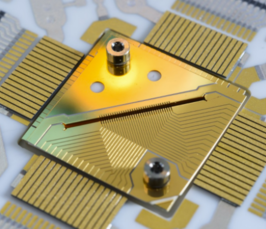Trapped (Rydberg) ions as a platform for quantum information processing (Prof. Ferdinand Schmidt-Kaler)
- (in-person)
- Datum: 26.07.2022
- Uhrzeit: 14:30
- Vortragende(r): Prof. Ferdinand Schmidt-Kaler
- Johannes-Gutenberg-Universität, Mainz
- Ort: Max Planck Institute of Quantum Optics
- Raum: Herbert Walther Lecture Hall

We are implementing these gates in a reconfigurable qubit register and have realized multi-qubit entanglement, more recently fault-tolerant syndrome readout [2] in view for topological quantum error correction [3]. I am describing architectures, which combine individual addressing of ion qubits with qubit transports and reordering within the segments of one trap [4], and sketch the required trap technologies and fabrication methods, qubit control, circuit compilation [5] and user interface. In the IQuAn architecture [6] we plan to execute the qubit register reconfiguration operations in parallel with quantum gate operation and connect this quantum processor to the MOGON-II HPC. Ion transport between traps [7] may allow for further scalability. For sub-µs gate operations we investigate Rydberg-ion specific approaches [8,9].
[2] Hilder, et al., Phys. Rev. X.12.011032 (2022)
[3] Bermudez, et al., Phys. Rev. X 7, 041061 (2017)
[4] Kaustal et al., AVS Quantum Sci. 2, 014101 (2020)
[5] Kreppel et al., arXiv:2207.01964
[6] https://iquan.physik.uni-mainz.de/
[7] Stopp et al., Quantum Sci. Technol. 7 034002 (2022)
[8] Mokhberi, Hennrich, Schmidt-Kaler, Adv. in at., mol., opt. phys., Academic Press, Ch. 4, 69 (2020)
[9] Vogel, et al., Phys. Rev. Lett. 123, 153603 (2019)